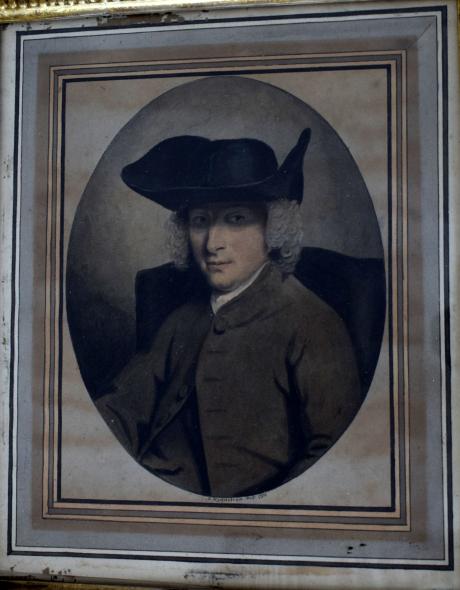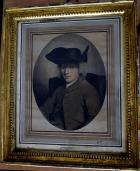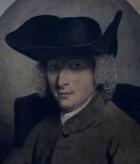signed and dated " J Myddleton delt 1794"
Balfour, James, of Pilrig (1705–1795), moral philosopher, was born at Pilrig, near Edinburgh, the eldest child of James Balfour (1681–1737), businessman, and his wife, Louisa,née Hamilton (1686–1750), of Airdrie. His brother John Balfour (1715–1795) became a prominent Edinburgh bookseller and papermaker. James was sent by his father to study at Leiden in 1729. Having returned later that year, he was called to the Scottish bar and was made advocate on 17 September 1730. In August 1737 he married Cecilia Elphinstone (1705–1780), and having served as treasurer to the Faculty of Advocates, he became sheriff-substitute of the county of Edinburghshire in 1748.
In 1754, on the death of William Cleghorn, Balfour was appointed professor of moral philosophy at the University of Edinburgh, despite Cleghorn's reported recommendation that the post go to Adam Ferguson. Balfour's timely attack on David Hume in his anonymously published work A Delineation of the Nature and Obligation of Morality with Reflexions upon Mr. Hume's Book Entitled ‘An Inquiry Concerning the Principles of Morals’ (1753) much improved his chances of election. However, Balfour proved a far from accomplished teacher, and the moral philosophy class at Edinburgh ‘dwindled to nothing’, prompting efforts to replace him (Sher, Church and University, 107). In June 1759 there was an unsuccessful proposal to give the chair to Ferguson. In 1761 Lord Provost George Lind tried again to remove Balfour, asking Lord Milton to suggest that the professor be made commissary clerk in exchange for his resignation from the university. Two years later Principal William Robertson proposed to make Balfour sheriff-depute in exchange for his vacation of the chair. Finally, in 1764 Adam Ferguson was able to take tenure as Balfour accepted transfer to the professorship of the law of nature and nations.
Balfour was the author of three philosophical studies. In his Delineation of the Nature and Obligation of Morality he sought to establish principles through which the good of individuals may be made to coincide with the ‘general good’. Private happiness was posited as the chief end of each person, while it was the good of others that was supposed to constitute the greatest happiness. Moral obligation was based on the will of God. Balfour adopted Francis Hutcheson's notion of a ‘moral sense’ as the basis of moral judgements emphasizing the beauty of the virtuous character in a manner close to the third earl of Shaftesbury, and attempted to subvert Hume's ‘anatomical’ portrait of human individuals motivated by pride and self-interest. Selfish motives and pride, in particular, were judged inimical to the general good of society, with Hume's refusal to condemn such motives being seen as an abandonment of the moral philosopher's duty to cultivate selfless motives and humility in his audience. Balfour accepted that ‘a general sentiment of humanity’ did not naturally arise and therefore believed it imperative that the moral philosopher encourage such passions in society. His attempt to do so involved liberal citation of classical examples and the use of Christian language and argument. Hume's response, a politely engaging letter to the author via the publishers, was met with a reply from Balfour, which is printed in the family history (Balfour-Melville, 113–16).
In 1768 Balfour's Philosophical Essays (also published anonymously) presented reflections on ‘academical philosophy’, ‘active power’, and ‘liberty and necessity’. His views were critical of Lord Kames as well as Hume. The Philosophical Dissertations (1782) contained essays on matter and motion, liberty and necessity, the foundation of moral obligation, and evidence for the truth of revealed religion. Balfour's eldest sister, Helen, married the Edinburgh bookseller and publisher Gavin Hamilton; their eldest son, Balfour's nephew, wasRobert Hamilton (1743–1829), professor of mathematics in Marischal College, Aberdeen, and author of a treatise on the national debt. The character David Balfour in Kidnapped was modelled on Balfour's cousin, who was a great-great-grandfather of Robert Louis Stevenson. James Balfour died at his home, Pilrig House, near Edinburgh, on 6 March 1795.
Christopher J. Finlay DNB
Apart from this watercolour, the only other record of J Myddleton is as a miniature painter and 'honorary exhibitor' at the Royal Academy of Arts in 1803.



